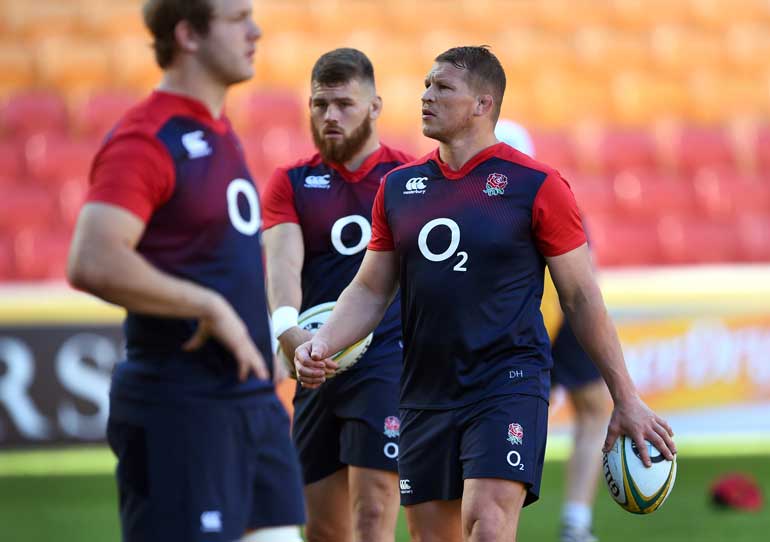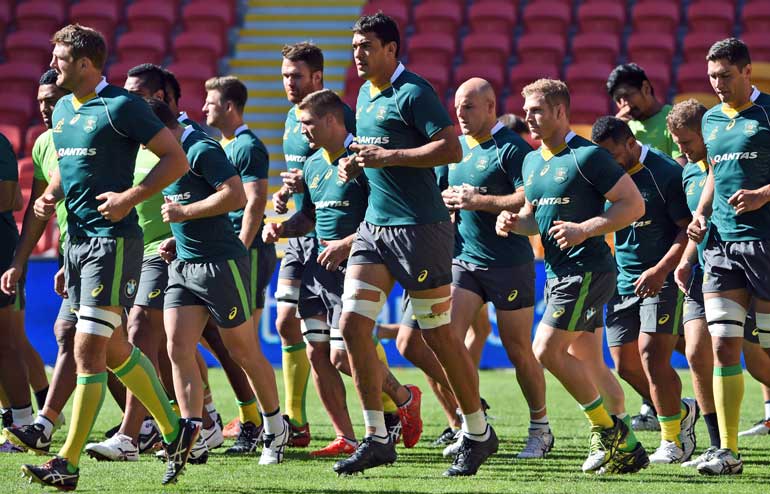Saturday Feb 21, 2026
Saturday Feb 21, 2026
Saturday, 11 June 2016 00:00 - - {{hitsCtrl.values.hits}}
 England rugby captain Dylan Hartley (R) walks from the field during the captain’s run in Brisbane on 10 June, ahead of the first rugby Test match against Australia on 11 June – AFP
England rugby captain Dylan Hartley (R) walks from the field during the captain’s run in Brisbane on 10 June, ahead of the first rugby Test match against Australia on 11 June – AFP
Reuters: World number two against world number four, two entertaining former club mates as opposing coaches and grudges recent and old to savour – Australia’s clash with England is shaping up to be the most intriguing of the June test series.
Saturday’s opener in Brisbane will be Australia’s first outing since last year’s World Cup final and a chance for Wallabies coach Michael Cheika to prove he is on track with his mission to challenge All Blacks supremacy.
For England, the three tests present an opportunity to gain a measure of revenge for the shattering 33-13 defeat which evicted them from their own World Cup last October.
The English have won seven successive matches since that darkest of nights at Twickenham and, under Cheika’s former Randwick team mate Eddie Jones, secured a first Six Nations grand slam since 2003 in the process.
That was the year, of course, that Clive Woodward’s team beat Australia in Sydney to win the World Cup but England’s trips Down Under have rarely been anywhere near as successful, especially when taking in Brisbane.
England have never beaten Australia in the Queensland capital and an under-strength team suffered a humiliating 76-0 reverse at Lang Park on the “Tour from Hell” of 1998.
No one is expecting anything nearly as one-sided on Saturday even if Jones knows England must brush off the fatigue of a long season if they are to get an early foothold in the series.
His talk of this being rugby’s “Bodyline” series – echoing the cricket tour of the 1930s when England used aggressive tactics to compete with more gifted Australian players – is more than just pre-tour mind games.
Big units
Jones will want his team to beat up the Wallabies – monster them at the scrum, disrupt their lineout, send big ball-carriers crashing over the gainline and hammer them into the turf at the breakdown.
Cheika, a former number eight, has always been aware that teams have to earn the right to play rugby with their work in the trenches, however, and believes his players are up for a scrap.
Australia will have six forwards on the bench and two of the three new caps in the starting side are what Cheika likes to call “big units”, 108-kg centre Samu Kerevi and 2.08 metre lock Rory Arnold.
The Kerevi-Tevita Kuridrani centre partnership, while rich in line-busting potential, deprives Australia of their traditional second receiver at inside centre to complement flyhalf Bernard Foley, however.
Jones too has abandoned the twin playmaker model that worked for England in the Six Nations by dropping George Ford, moving Owen Farrell to flyhalf and pairing Luther Burrell and Jonathan Joseph in the centres.
Ford had a miserable evening with the boot in England’s warm-up match against Wales and while Farrell may be less creative with ball in hand, his kicking is top class.
Jones may have more ambitious plans for England in the future but is first and foremost concerned to ensure the green shoots he has nurtured since he took over as coach are not scorched in the red dirt of his homeland.
 New Australian Wallabies rugby player Rory Arnold (C) runs with teammates during the captain’s run in Brisbane on 10 June – AFP
New Australian Wallabies rugby player Rory Arnold (C) runs with teammates during the captain’s run in Brisbane on 10 June – AFP